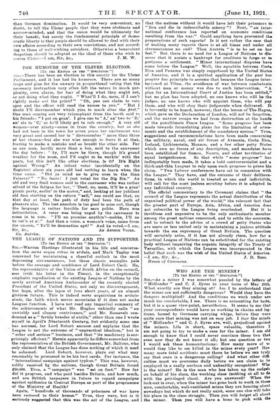THE LEAGUE OF NATIONS AND ITS SUPPORTERS. [To THE EDITOR
Or THE " SPECTATOR."] 8m,—Warren Hastings illustrated in his life and conversa- tion the mens aequa rebus in arduis, and Mark Tapley was renowned for maintaining a cheerful outlook in the most depressing circumstances, but these classic examples pale before the courage and confidence of Lord Robert Cecil. He, the representative of the Union of South Africa on the council, sees (vide his letter in the Times), in the exceptionally emphatic repudiation of the existing League of Nations by the newly arrived American Ambassador of the recently elected President of the United States, not only no discouragement, but hope, after the lapse of four short years, of an almost glorious future. This is indeed mans aequissima in arduis- simis, the faith which moves mountains if it does not make Leagues function. I have not read any impartial summary of the achievements of what Mr. Hughes unkindly calls " an unwieldy and clumsy contrivance," and Mr. Roosevelt con- demned as a " fertile breeder of strife," other than one I wrote myself in April's Nineteenth Century, but evidently some one has accused, for Lord Robert excuses and explains that the League is not the outcome of " unpractical idealism," but is "sober and serious " business, and that "its machinery is sur- prisingly efficient." Herein apparently he differs somewhat from the representative of the British Government, Mr. Balfour, who only olaimed that the League has done nothing of which it need be ashamed. Lord Robert, however, plays out what may reasonably be presumed to be his best cards. For instance, the " international campaign against typhus." This was, however, coldly received by the nations, though Great Britain found £50,000. True, a " campaign" was " set on foot." How far did it progress, and who*paid besides Britain, and how much, and are British taxpayers in future to regard campaigns against epidemics in Central Europe as part of the programme of the Ministry of Health?
Again, "hundreds of thousands of prisoners of war have been restored to their homes." True, they were, but is it seriously suggested that this was the act of the League, and
that the nations without it -would have left their ,prisoners to " live and die in indescribable misery"? Next, " an inter- national conference has reported on economic conditions resulting from the war." Could anything have prevented the preparations of such reports? Is it not rather the ease that of making many reports there is at. all times and under all circumstances no end? Then Austria " is to be set on her feet." But there is no need for a League of Nations to dis- cover that it assists a bankrupt for creditors to forgo or to postpone a settlement. " Minor international disputes hays come before the League." Well, the squabble between Costa Rica and Panama was simply suppAssed by the United States of America, and it is a spirited application of the post hoc propter hoc principle to assume that because the League inter- tervened at Vilna, the avoidance of war between combatants without men or money was due to such intervention. " A plan for an International Court of Justice has been settled," but no plan has been adopted, no one knows who will be the judges, no one knows who will appoint them, who will pay them, and who will obey their judgments when delivered. It is fervently to be hoped, however, that the lesson of The Hague, which gave us the Declaration of London, will not be forgotten, and the narrow escape we had from destruction at the hands of the penultimate Peace League. " Some progress has been made towards formulating plans for the limitation of arma- ments and the establishment of the mandatory system." True, suggestions and recommendations have been made concerning the military, naval, and air forces of Armenia, Costa Rica, Iceland, Lichtenstein, Monaco, and a few other petty States which own no forces of any description, and mandates have been established for Samoa, Nauru, and other territories of equal insignificance. So that while " some progress" has indisputably been made, it takes a bold controversialist and a thick-and-thin Leaguer to rely upon such progress to prove his claim. "Two Labour conferences have sat in connexion with the League." They have, and the outcome of their delibera- tions, in which the world is treated as one and indivisible, will call for the most jealous scrutiny before it is adopted in any individual country.
The official commentary to the Covenant claims that " the council of the League represents the actual distribution of the organized political power of the world," the relevant fact that the greater part of Europe, Asia, Africa, and America, does not subscribe to the League being overlooked. But it is invidious and expensive to be the only enthusiastic member among the great nations concerned, and to settle the accounts, and to submit to the advice of a crowd of petty States who are more or less united only in maintaining a jealous attitude towards the sea supremacy of Great Britain. The question will certainly arise, if it has not already risen, how far a practical League of Nations can be substituted for the existing body without impairing the organic integrity of the Treaty of Versailles, with which the League was incorporated in the belief that such was the wish of the United States of America.


































 Previous page
Previous page